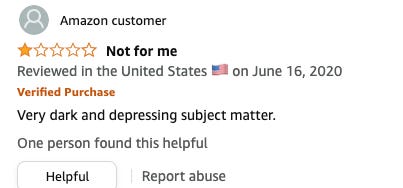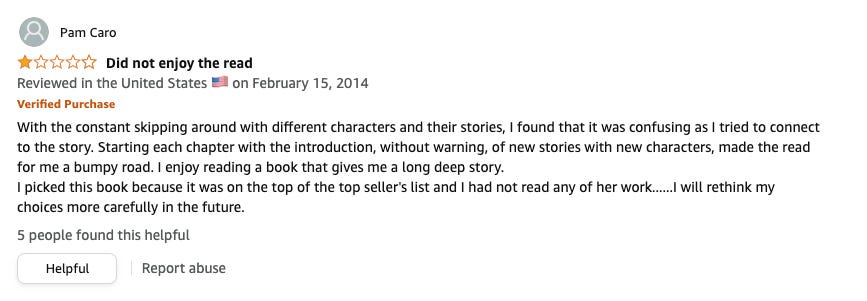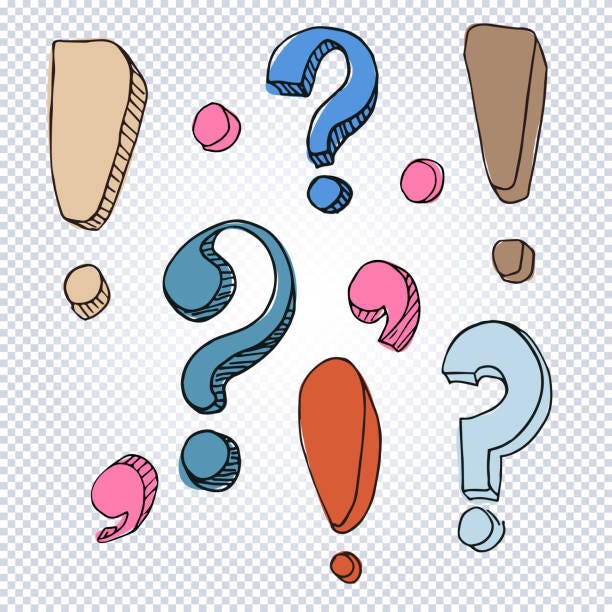I’m actually in a pretty good mood, but it’s ($^&(!?% January, and it was -6 F when I walked my dog this morning, so here are four cranky rants:
Listen, some reviews are stupid:
A heartbroken debut author took to Twitter the other day to say she’d received her first one-star review on Amazon, and it had wrecked her. I’m not going to quote or screenshot her here, but I will say two things for those with books out, or those who hope to subject a book to the internet’s judgment one day:
Stop looking. Early on (like, before publication) online reviews can be a bellwether, and I do still look at my own Goodreads a few times before a book is out, just to see if the discourse is going to be “Oh my God, I can’t believe she let a character eat a hamburger on page 47!” But once you’ve been assured that isn’t the case… there’s nothing there for you. Block the site if you must.
Plenty of one-star reviews are valid and well-articulated. But a lot of them are really, really dumb. For the sake of this newsletter, I ignored that first bullet point and dove into my own one-star Amazon reviews for The Great Believers.
First, there are plenty like this…
…from people who do not understand that book ratings are not for reviewing the third-party seller.
Then there are the “this book isn’t exactly the very thing I was looking for” folks:
To be fair, it really is my fault for not writing a more cheerful and lighthearted book about [checks notes] AIDS.
Then, oof, there are just the super obtuse ones.
This is my favorite review of all time, for Nobel Laureate Alice Munro’s story collection (repeat, story collection) Dear Life:
Oh, Pam. Pam, Pam, Pam. I do feel for her, trying to figure out what on earth chapter 2 had to do with chapter 1, and so on…
The Harshest Note in My Files:
In each Writer Edition, I’m pasting paragraphs from the file of notes I write so frequently in student response letters that I just keep them on hand.
I have a massive section on punctuation, with both rules and exhortations. Those exhortations are ranked from gentlest to harshest—with the harshest reserved for students (ones without language-based learning disabilities, etc.) who have previously resisted or ignored this feedback.
You have an enormous number of mistakes in your punctuation, including your punctuation of dialogue. You’re not making any one mistake consistently—you’re making many of them in rapid succession. Not only is punctuation mechanically important (can you imagine a mathematician who doesn’t understand decimal points?) but beyond that—punctuation is the musical notation of language. It controls the meaning of the line, but it also controls the reader’s attention and breath.
If you haven’t taken the time to study and understand punctuation, you are neglecting one of the greatest tools at your disposal. Writing is words and punctuation marks; that’s it. Those are the only things you have. Please be professional and take the time to study this. Editors will not fix it for you, because this manuscript will not be taken seriously to begin with if you don’t evince mastery of language. Furthermore, it will reflect poorly on the institution that gave you a terminal degree in creative writing.
To be fair, I think I’ve only included those last two lines once, with a student who kept arrogantly insisting that she knew better than me because she’d had an internship once at a magazine, and editors wouldn’t care about mechanics because it would all get fixed later. (Editors: Notoriously cavalier about language!)
What the Hell, South Dakota and Alaska??
Get with the effin program.
My Top Ten Literary Pet Peeves
You might strongly disagree. That’s why they’re PET peeves. I stroke them like weird like lap animals.
#10: Someone being shaken out of a daydream or memory by someone who has apparently already been saying their name many times; it’s a filmic convention to get us out of the memory and back into present scene. We don’t need that on the page.
#9: People shrugging words, or nodding words, or smiling words. “Sure,” he said makes sense. “Sure,” he frowned does not.
#8: A character is introduced with “his name was either Mike or Mark” and then each time he’s referred to again the name becomes “Mark-Mike” or “Mark/ike,” etc. It’s an effective way of indicating dismissal, but it’s one of those writerly clichés – things we only do on paper that crop up again and again.
#7: Strangers have an entire conversation and then at the end one of them goes “By the way, I’m Gladys.” People don’t do this! Human people say something like “Sorry, I didn’t catch your name.” (It’s the “by the way” that gets me.)
Keep reading with a 7-day free trial
Subscribe to SubMakk to keep reading this post and get 7 days of free access to the full post archives.











